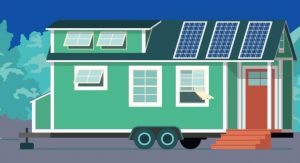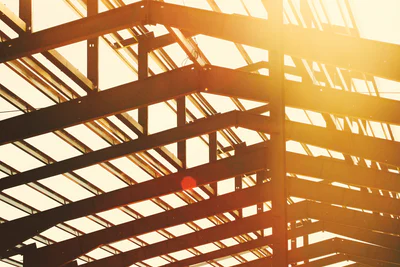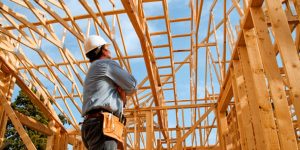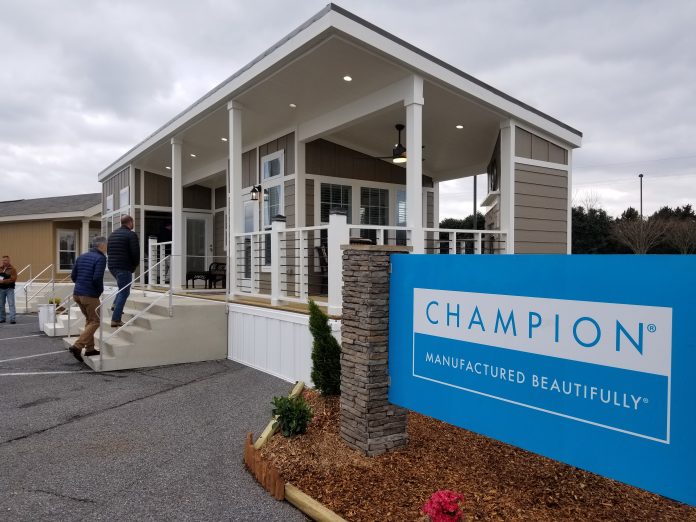1. Mobiles Homes are ultra-customizable
Mobile homes are more than just a box. One overlooked feature of a Mobile Home is how easy it is to customize. Our builders offer thousands of options with each print. Some of the more robust manufacturers will even offer different qualities of material for each option. For example, trim will often be offered as vinyl wrapped MDF, or if you’d like to have a more classic look, trim can done in a stained hardwood. Combine this option with the various combinations of carpet, wall colors, wall panels, bathroom features, and more, and you can build one home in literally millions of ways. This is before considering the thousands of floorplans, and within that, thousands more floorplan variations from each builder. As you can see, mobile homes are very easily customized. Builders will often have a treasure trove of previously engineered prints that you can choose from. This means you won’t have to pay another “engineering fee” to get that particular floorplan certified, it’s already been done by a past customer! This is different from conventional home builders, where each modification will require a re-engineering, and will be unique (and costly) to that particular project. Another advantage manufactured home builders have is that all of their supplies are on-site. If you ask for a certain kind of countertop they offer or a different marble, they will have it in stock in-house. This saves both parties money and contributes to a much faster build time than would be possible with a stick-built home.
One often overlooked benefit of a Mobile Home is how customizable it is. Our builders offer thousands of options in each home, ensuring you can create he perfect
2. Mobile Homes are safer for your Children
Not only does having material on site reduce the time it takes to build your home, creating a home indoors also means that home will be built safer. How? Quality control. In an on-site project, your home will be subject to the weather, local building material, and whatever random contractor is hired to work on your home. This leads to unpredictability in the building supply and unpredictability in how the home itself is built. No two stick-built home is the same, and not in a good way!
Manufactured homes are built in a climate-controlled factory, away from the ravages of weather and interruptions of schedule that inevitably happen in a site-built project. This means no water damage, sun damage, or mold growing on your new home. I think we can all agree, black mold is not something you’d want in a brand new home. The rigidity of schedule and the repeatability of process in building your home means each construction worker in the factory knows exactly what they’re doing, and your home will be built better, and more solid than a stick-built home ever could be.
The assembly line is not something to be understated. Homes built in a factory are sturdier than ever. Having a predictable floorplan, and using the same materials many times a day means the manufacturer is able to make less mistakes, and your home will benefit as a result. Having essentially one “builder” create the home from start to finish means they can implement insulation every step of the way, which makes the home more energy efficient than it’s stick built counterpart.
Manufactured homes are also built to withstand the rigors of highway travel. As a result, they are largely over-engineered to account for that moving and flexing they will experience. Next time someone asks about how well your mobile home is built, tell them modern manufactured homes are actually framed to be strong (that’s right, stronger) than a stick built home.
3. You'll get your home faster
Another oft-overlooked advantage of assembly line construction of your home, is the speed at which your home will be made. Ever heard the saying “practice makes perfect”? The same holds true in the assembly line, where workers have practiced making the same cabinets, framing, roofing, so many times that your home is built to the workmanship of a skilled tradesman.
Manufactured housing has gone through several revolutions, and we are a far-cry from the “trailer home” of yesteryear. The industry has maintained a strong pro-innovation approach, and is up to date with some of the most exclusive building trends today. Stick-built construction, however, has not changed much for the hundreds of years it’s been around.
Build times for homes vary, but are always faster than a site-built home. Some more affordable variants of mobile homes can be built in as little as a few hours, while others will take several days as works put finishing touches on drywall, interior arches, or double-insulated windows. Having material on-hand drastically reduces the back-and-forth that is typical in a site-built project. In fact, the longest you’ll wait for a manufactured home is for previous orders to be made first!
Up until now, we’ve only been talking about the construction of the home. Another point to consider is the foundation of your home. Most mobile homes are similar sizes, so engineering a concrete foundation will be a simple and easy task. Unless you have a basement, the engineer usually only has to review your design and give his seal of approval. It’s important to maintain constant activity on your plot of land while your home is being built in the factory, so when the home comes “offline” you’ll be able to set it and move in as soon as possible. Even setting the home on its foundation is quick! The truck will back the home onto its base, and a contractor will level the home for you while covering up the sides with siding.
4. Built to a national Code
Manufactured Homes are built to the national HUD code. This means your home can be placed almost anywhere in the nation, without having to adhere to that local municipalities building codes. This is the result of a national law that requires all jurisdictions to accept homes built to this HUD code. While local building codes are often arbitrary and will require unnecessary, and often times expensive modifications to a home plan, the HUD code will override these building codes and ultimately save you money over domineering local officials. If your town or city is giving you trouble, point out to them that the HUD code is national, and allows you to place your home wherever you would like. The only exception to this rule is in communities that require a certain “roof pitch” that mobile homes are not built with. Even then, you can simply adhere to that roof pitch and will legally have the right to move your home in.
By having its own unique building code, a manufactured home is also easier to inspect. There are multiple inspections that occur during construction, before the home even leaves the factory floor. Once situated on site, the home then undergoes a rote inspection to ensure it has complied with that particular HUD standard (which it has). This is just to confirm that the HUD label on the home genuine reflects the HUD status that the home has been built to. This type of inspection, to obtain the “certificate of occupancy”, is less stringent than a stick built inspection, and simply gets you into your home faster.
Mobile homes are called many things. Whether you're looking for a house trailer for sale, or manufactured housing, or a mobile trailer, you're referring to the same thing. They are all built to the same national HUD code.
5. Green Tech
Because mobile homes are built in one facility, all by the same manufacturer, the building process is very tight. With this precise method of manufacturing comes better insulation installation. This leads to increased energy efficiency of the home. During the winter and summer months, you home will be easier to heat and easier to cool. It will keep it’s temperature very well, with only minimal energy needed to maintain equilibrium. Builders cover the home with sheating, and use caulk and sealant to close any air leaks or gaps. Unlike traditional home, electrical outlets are sealed with the rest of the home, creating an air-tight box. One word synonymous with the mobile home industry? Efficiency.
6. Wayyy more affordable
With a mobile home, you save in multiple ways. The most obvious is the cost to manufacture the home. Manufacturers save money by purchasing building materials by the train-load, and assembling everything (from the frame to texturing the walls) in house. This concentration of services in one area significantly reduces the time spent, and effort spent to build a home. Instead of hiring multiple contractors who will all apply their own premium to the cost of services, every tradesman in the building is employed by the same company. The scale at which mobile homes are produced, and the predictable demand for affordable housing means manufacturers can price their product very competitively. Although they’re built from the same material, manufactured homes can cost up to 30% less than a stick built home. Once on-site, property tax on a manufactured home is much, much lower than that of a traditionally constructed home. And finally, the aforementioned energy efficiency of the home allows for lower heating & cooling bills, again saving you money. Since they are constructed to tightly, there will be less maintenance on your home.
7. Easy to finance, and they Appreciate!
Due to the lower cost of a mobile home, it is actually easier to obtain financing. We offer loans to those with very, very low credit scores simply because the original purchase price of the home is so little. Make no mistake, mobile homes can be financed. If you do obtain a loan for your new home and place it on land, it will actually appreciate with the land. Mobile homes of today are much less likely to depreciate like older mobile homes, because they are built to a much higher standard. Don’t underestimate the amount of value you can add to your land with a mobile home!
8. Pay a Loan instead of Rent
Are you renting? If so, you should seriously reconsider how you’re spending your money. Consider this, the cost of a mobile home is so low that you more than likely would qualify for a loan. And how much are those loan payments? Cheaper than rent?
What a lot of people don’t realize is the amount they’re paying in rent, they could be paying towards a mobile home. Except in the first instance, the money is only going towards rent and does not build your equity or credit like a loan does. You must ask yourself, how long are you planning on living there? If it’s for any substantial amount of time, it would be much smarter to put your money to use! And you can always pay the loan off early if you change your mind. This is another reason mobile homes make for great first houses. They are low maintenance, and it’s a very easy transition from monthly rent payments to monthly loan payments. The only difference is who you’re paying, your landlord or a bank!
Are Mobile Homes a Good Investment in 2023?
Yes. Mobile homes are an excellent investment opportunity because you can buy a prefabricated home for significantly less money than a single-family home. And the mobile home is also much cheaper to maintain and has lower utility costs.
The recent housing market has pushed more people to buy smaller homes, like mobile homes, because of the low inventory and competitive prices. And as interest rates rise in 2023, more people can’t afford the mortgage on single-family houses, creating more demand for small compact mobile homes.
Whether you are buying it as a rental unit or as a living space, a mobile home is a safe investment in 2023. At Home Nation, we offer an extensive inventory of high-quality mobile homes to fit your investment or living needs.
What is the Lifespan of a New Mobile Home?
The quality of manufactured housing has increased dramatically from 20 to 40 years ago. The Manufactured Housing Institute reports that mobile homes not only retain their value similarly to single-family homes, but they can also last up to 55 years.
The building quality and house materials are significant factors in the lifespan of a new mobile home. You’ll want to choose a builder known for quality construction to ensure a longer lifespan of the house.
What is the Average Price of a New Mobile Home?
Since 2020, manufactured homes have spiked in popularity, increasing the demand for the average price. In 2021, a new mobile home averaged about $108K, rising almost 20% from the previous year.
While this average is high, the average for a single-family home also increased to about $454K, making the mobile home significantly more affordable. We offer a wide variety of single, double, and pre-order homes for competitive pricing without sacrificing quality. Check out our Home Nation mobile home models.
Disadvantages of Buying a Mobile Home
While we’ve highlighted the main advantages of buying a mobile home, there are a few disadvantages you should be aware of before you buy:
-
Availability: High demand has made mobile homes more scarce because of current economic conditions. You may also encounter difficulty finding suitable land or mobile community space to establish your mobile home.
-
Fewer Financing Options: Mobile homes have fewer financing options compared to single-family homes. We offer affordable financing options to help you find a mobile home that fits your needs and budget.
-
Fewer Amenities and Customization: Some manufactured new homes have fewer customization options than buying a single-family home.
-
Community Fees: Many mobile communities charge additional fees to live in their community. You’ll want to research the community’s fees and restrictions before buying.
-
Lingering Stigma: While the growing popularity of tiny homes and the increased quality of new mobile homes have diminished the stigma of owning a mobile home, you may find it to be harder to sell because of any lingering stigma.
Thinking of buying a mobile home in your area? Learn more about our affordable, high-quality mobile homes.









